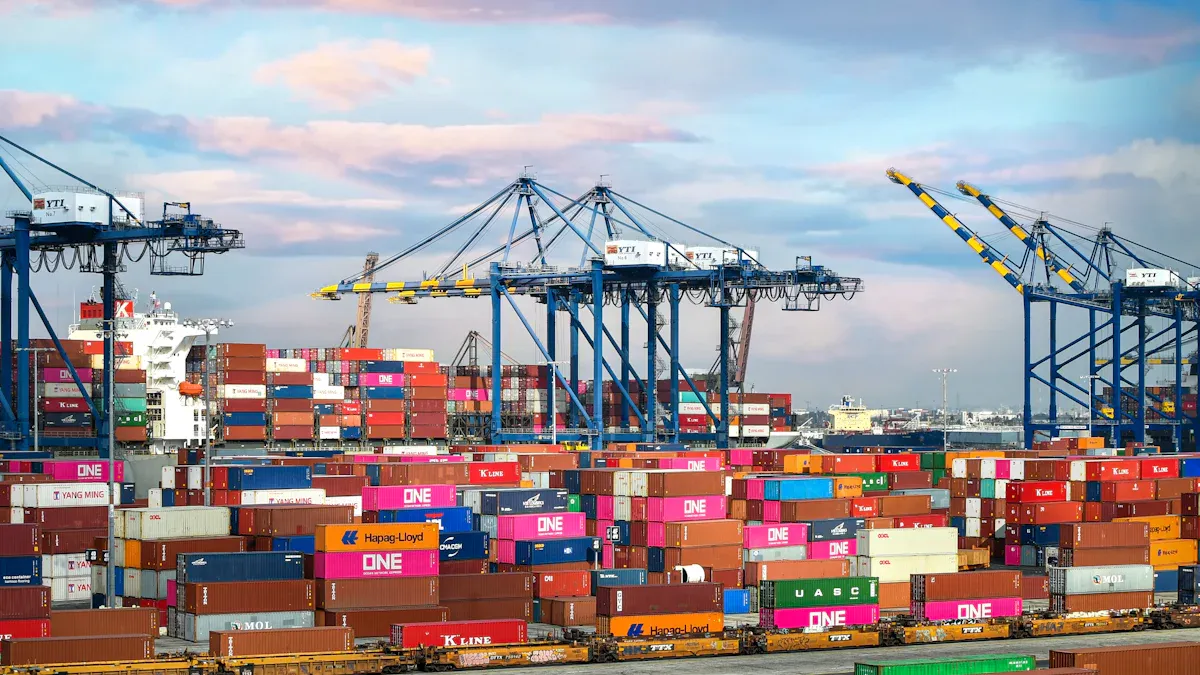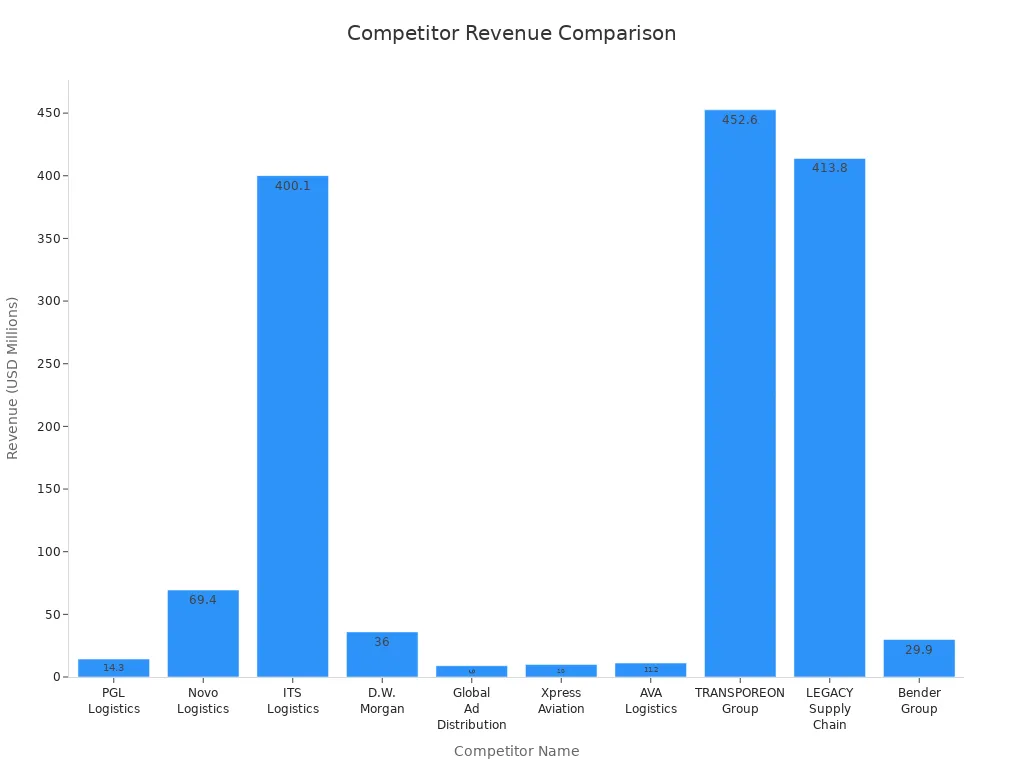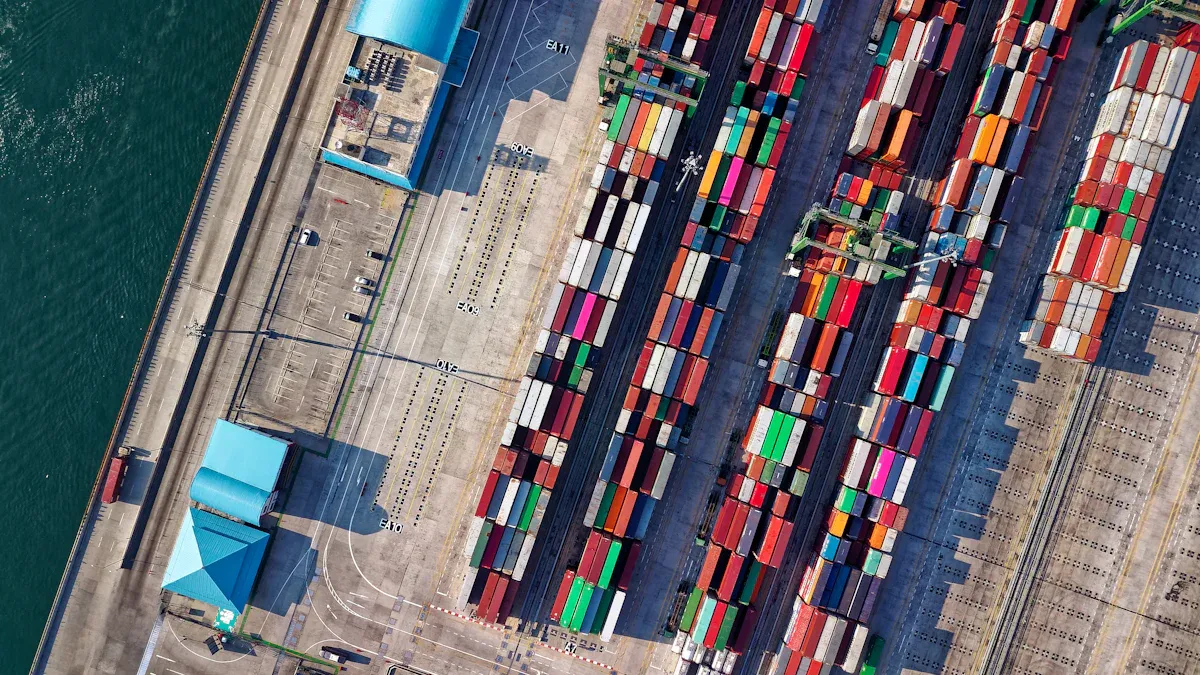How PGL Stacks Up Against Other Logistics Companies

Imagine you must choose a logistics partner for your growing business. You want flexible services, strong support, and a team that understands your industry. Many companies compare options like pgl vs other logistics companies to see who fits best. Check the table below for the top criteria businesses use when making this choice:
Criteria | Description |
|---|---|
Industry Experience and Expertise | Select a provider with knowledge in your field. |
Technology Capabilities | Look for advanced tools and real-time tracking. |
Scalability and Flexibility | Make sure the company can handle growth and changes. |
Reliability and Performance | Review service history and reliability. |
Network and Infrastructure | Consider geographic coverage and delivery resources. |
Cost Structure and Transparency | Seek clear pricing and no hidden fees. |
Customer Service and Communication | Value quick responses and open communication. |
Understanding both strengths and weaknesses helps you make the smartest decision.
Key Takeaways
PGL offers flexible logistics solutions tailored to various industries, making it a strong choice for businesses needing adaptability.
When choosing a logistics partner, consider their industry experience and technology capabilities to ensure they meet your specific needs.
PGL excels in customer service, providing a single point of contact for support, which enhances communication and problem-solving.
Evaluate the network reach of logistics companies; PGL is strong in North America but may not match the global presence of larger competitors.
Before deciding, clarify your logistics goals and ask potential partners about their technology, pricing, and service offerings.
Company Profiles

PGL Overview
You may know PGL (Perimeter Global Logistics) as a company that focuses on flexible logistics solutions. PGL works with many industries and offers services like freight forwarding, warehousing, and supply chain management. The company has a reputation for strong customer support and a control tower approach, which means you get a single point of contact for your shipments. PGL shows consistent operational performance and sound financial health. However, you will not find public details about its revenue, shipment volume, or customer base. This means you might need to ask for more information if you want a complete financial picture.
Competitor Snapshots
When you compare pgl vs other logistics companies, you see a wide range of competitors. Some companies have much larger operations and higher revenues. Others focus on specific regions or services. The table below shows how PGL stacks up against some of its main competitors:
Competitor Name | Revenue | Number of Employees |
|---|---|---|
PGL Logistics | $14.3M | 102 |
Novo Logistics | $69.4M | 207 |
ITS Logistics | $400.1M | 937 |
D.W. Morgan Company | $36M | 152 |
Global Ad Distribution | $9M | 37 |
Xpress Aviation | $10M | 41 |
AVA Logistics | $11.2M | 46 |
TRANSPOREON Group | $452.6M | 1060 |
LEGACY Supply Chain Services | $413.8M | 969 |
Bender Group | $29.9M | 98 |

You can see that some competitors, like ITS Logistics and TRANSPOREON Group, have much higher revenues and more employees. These companies may offer broader networks or more resources. Smaller companies, such as Global Ad Distribution, focus on niche markets or specialized services. This variety gives you many options when choosing a logistics partner.
pgl vs other logistics companies

Service Range
When you look at pgl vs other logistics companies, you see big differences in the services each company offers. PGL gives you flexible solutions. You can choose from freight forwarding, warehousing, and supply chain management. PGL also helps with project cargo and time-critical shipments. This flexibility makes PGL a good choice if your needs change often.
Some competitors offer even more services. Companies like DHL Group and Kuehne + Nagel have a global presence and a very wide service range. They handle everything from mail and parcel delivery to digital transformation in logistics. Kenco and Delmar International focus on integrated logistics and personalized strategies. These companies have decades of experience and serve many industries.
Here is a table that shows how some top logistics companies compare in service range:
Company Name | Key Services Offered | Notable Features |
|---|---|---|
Global Leader, Inc. | Integrated transportation, customs clearance, inventory management | Excellence in international freight forwarding and export services |
Kenco | Distribution, eCommerce fulfillment, transportation management, supply chain solutions | Over 70 years of experience and operational excellence |
DHL Group | Mail and parcel services, logistics solutions, digital transformation initiatives | Focus on sustainability and net-zero emissions by 2050 |
Kuehne + Nagel | Air and sea logistics, road and contract logistics, end-to-end supply chain solutions | Operates in nearly 100 countries, strong on sustainability |
Delmar International | Freight forwarding, customs brokerage, warehousing | Personalized services and innovative strategies |
When you compare pgl vs other logistics companies, you notice that PGL stands out for flexibility and industry focus. Larger companies like DHL and Kuehne + Nagel offer more services and have bigger networks. If you need a partner who can handle every part of your supply chain, these global leaders may fit better. If you want a provider who can adapt quickly and give you personal attention, PGL is a strong option.
Technology & Visibility
Technology plays a big role in logistics today. PGL uses a control tower approach. You get a single point of contact and real-time updates on your shipments. This system helps you track your goods and solve problems fast. PGL invests in digital tools to give you visibility and control.
When you look at pgl vs other logistics companies, you see that some competitors have even more advanced technology. DHL Group leads the way with digital transformation projects. They use artificial intelligence and automation to improve delivery speed and accuracy. Kenco and Kuehne + Nagel also use smart systems for tracking and reporting. These companies give you detailed dashboards and predictive analytics.
You should think about what level of technology you need. If you want basic tracking and strong support, PGL meets your needs. If you need advanced analytics or automated systems, a larger competitor may be better.
Tip: Ask each provider for a demo of their tracking tools before you decide.
Network Reach
Network reach is another key factor in the pgl vs other logistics companies debate. PGL has a solid network in North America and serves many industries. You get reliable coverage for domestic and cross-border shipments. PGL partners with carriers to extend its reach, but it does not have the same global footprint as some competitors.
DHL Group and Kuehne + Nagel operate in almost every country. They have thousands of employees and resources worldwide. This scale gives them an advantage in rate negotiation and delivery speed. Ware2Go and ContainerPort Group focus on the U.S. market but have large networks and strong infrastructure.
If your business ships worldwide, a global company like DHL may be the best fit. If you need a partner who knows the North American market and can adapt to your needs, PGL offers strong value.
Note: Larger networks often mean better rates and faster delivery, but smaller companies can offer more personal service.
Specialization & Support
Industry Focus
You want a logistics partner who understands your industry. PGL stands out because it serves many different fields. You can see how PGL compares to other companies in the table below:
Company | Industry Focus |
|---|---|
PGL Logistics | Aerospace, Automotive, Construction, Energy, Healthcare, Retail, E-commerce, Technology |
McLane Company | Grocery, Foodservice |
Home Depot Distribution | Home Improvement |
AmeriPac | Health and Beauty Brands |
DHL | Various Industries (less customization) |
PGL works with industries like aerospace, automotive, and healthcare. You get solutions that fit your business, whether you sell cars or medical supplies. Companies like McLane focus only on groceries and foodservice. Home Depot Distribution helps home improvement stores. DHL serves many industries, but often uses a one-size-fits-all approach. When you need a partner who can adjust to your unique needs, PGL gives you more options.
Tip: Choose a logistics company that knows your industry. This helps you avoid mistakes and delays.
Customer Service
Strong customer service makes your logistics experience better. PGL has earned high marks for its support. You can see some of the ratings and awards PGL has received:
Rating/Award | Organization | Description |
|---|---|---|
'A' rating | A.M. Best | Shows excellent ability to meet ongoing insurance obligations. |
'A' rating | S&P Global | Given to companies with a stable outlook and good business risk profile. |
Hawaii Best Place to Work | Employee Votes | Employees voted PGL as a top workplace. |
You get help from a team that cares about your business. PGL’s ‘A’ ratings show that you can trust them to handle your shipments and solve problems quickly. Employees also rate PGL as a great place to work. Happy employees often give better service to customers.
Note: Good customer service means you get answers fast and problems solved without stress.
Strengths & Weaknesses
PGL Strengths
You get several advantages when you choose PGL as your logistics partner. PGL stands out for its flexibility and customer support. The control tower approach gives you a single point of contact, making communication easy and clear. You can expect solutions tailored to your industry, whether you work in healthcare, automotive, or technology.
Here is a table that shows how PGL’s flexibility and control tower approach benefit you:
Benefit | Description |
|---|---|
Operational efficiency | You see faster and smoother logistics operations. |
Reduced denials | Fewer denied claims help your cash flow. |
Improved compliance | You meet regulations and avoid costly mistakes. |
Audit risk reduction | Better tracking lowers your audit risks. |
Increased revenue and profit | Strong processes help you earn more. |
Transparency | You always know where your shipments are. |
Customizable reporting | You get reports that fit your business needs. |
Real-time workflow management | You control shipments as they move. |
Comprehensive audit trail | You can check every step for accuracy. |
Accounts receivable control | You manage payments and collections better. |
KPI monitoring | You track your key goals and measure success. |
PGL’s strengths help you stay in control and adapt quickly. You can solve problems before they grow.
PGL Weaknesses
PGL does not have the same global reach as some of the largest logistics companies. You may find that its network is strong in North America but less extensive worldwide. PGL also operates on a smaller scale, which can limit its ability to offer the lowest prices or the fastest delivery in every region. If your business needs a partner with a massive international presence, you might need to look at other options.
Limited global footprint compared to industry giants.
Smaller scale may mean fewer resources in some markets.
Less public financial data makes it harder to compare at a glance.
Note: If you need worldwide coverage or the lowest possible rates, you may want to compare PGL with larger competitors.
Competitor Strengths
Many of PGL’s competitors have strengths that come from their size and reach. Companies like DHL, Kuehne + Nagel, and Ware2Go operate on a global scale. They can move goods almost anywhere in the world. Their large networks give them more power to negotiate rates and offer lower prices.
Higher volume orders give them more leverage with suppliers.
They often get discounts, which lowers their costs.
These companies can keep payments to suppliers longer, improving their cash flow.
The ability to produce at lower cost gives these companies a strong edge. They can offer better prices and win more business. In a price war, they can keep prices low for longer than smaller companies.
Competitor | Key Strengths |
|---|---|
DHL Group | Global network, advanced technology, low rates |
Kuehne + Nagel | Worldwide reach, strong analytics, experience |
Ware2Go | U.S. network, flexible fulfillment |
ContainerPort Group | Large infrastructure, port access |
AFS Logistics | Rate negotiation, broad service range |
Large competitors can deliver to more places and often save you money on shipping.
Competitor Weaknesses
Big logistics companies also have weaknesses. You may find that their service feels less personal. They often use standard processes for every client, which can make it hard to get custom solutions. Sometimes, you wait longer for support or answers because of their size.
Less flexibility to adapt to unique needs.
Customer service may feel less responsive.
Standardized solutions may not fit every industry.
Complex systems can slow down problem-solving.
When you compare pgl vs other logistics companies, think about what matters most to you: personal service or global reach.
Choosing Your Provider
Matching Needs
You want a logistics partner who matches your business needs. Start by looking at what matters most for your operations. Every company has different priorities. Some focus on cost. Others care more about speed or reliability. You should check if the provider’s culture fits yours. A partner who values reliability and solves problems quickly will help your business grow.
Here are key factors to consider when matching your needs:
Strategic alignment with your business goals
Experience and expertise in your field
Safety management for secure shipments
Trained staff for accurate packaging and delivery
Strong reputation for reliability
Professionalism and industry knowledge
Coverage that matches your geographic needs
Areas of expertise that fit your logistics requirements
Transparent pricing
Speed and technology for efficient service
Tip: Ask about safety training and technology tools. These can make a big difference in your shipping experience.
Company size also affects your choice. Larger businesses need partners who handle high volumes and offer cost-effective solutions. Smaller companies often prefer personalized service and flexibility. You can see how logistics models fit different needs:
Logistics Model | Description | Suitable For |
|---|---|---|
1PL | In-house execution with owned assets. | Manufacturers or regional distributors needing control. |
2PL | Asset-based outsourcing with external capacity. | Companies wanting hands-on coordination. |
3PL | Managed logistics partner handling execution. | Businesses with expanding logistics networks. |
4PL | Orchestration and oversight of multiple 3PLs. | Complex, multi-region supply chains needing strategic management. |
Industry Fit
Choosing a provider who understands your industry is essential. A poor fit can lead to higher costs, late shipments, and damage to your reputation. You should look for a partner with experience in your sector. For example, retail and e-commerce companies need fast order processing and efficient inventory management. Healthcare businesses require custom kitting and strict compliance. Manufacturing firms benefit from just-in-time delivery and streamlined workflows.
Logistics providers often tailor their services for each industry. They analyze your products, target markets, and challenges. Flexible technology helps them adapt to your needs. You may get dedicated account managers and regular updates. Some companies offer custom pricing to fit your budget.
Note: Providers with strong ESG practices show commitment to sustainability and ethical operations. This can boost your brand image.
When you choose a logistics partner, make sure their specialties match your requirements. Experience in your industry leads to better results and fewer problems. You get smoother operations and happier customers.
You see clear differences between PGL and other logistics companies. PGL helps you cut costs, speed up deliveries, and lower your carbon footprint. Many businesses save up to 20% each year and report higher customer satisfaction. Use these steps to choose your provider:
Clarify your goals.
Check technology compatibility.
Ask for clear cost details.
Review network coverage.
Contact references.
Impact Area | Description |
|---|---|
Cost Reduction | Minimizes fuel use and extra mileage. |
Delivery Speed | Optimizes routes for faster service. |
Sustainability | Supports green goals with smart planning. |
Customer Satisfaction | Improves service and delivery times. |
Weigh flexibility and support against global reach and pricing before you decide.
FAQ
What makes PGL different from global logistics companies?
You get flexible services and strong customer support. PGL focuses on your industry needs. Large companies offer bigger networks, but you may not receive personal attention.
Can PGL handle international shipments?
You can ship internationally with PGL. The company covers North America well and partners with global carriers for overseas deliveries. For complex global needs, larger providers may offer more options.
How does PGL’s technology help you track shipments?
You use a control tower system for real-time updates. This tool lets you see where your goods are and helps you solve problems quickly. Ask for a demo before you choose.
Is PGL a good fit for small businesses?
You benefit from PGL’s flexible solutions and personal service. Small businesses often need quick responses and custom options. PGL adapts to your needs and helps you grow.
See Also
PGL Enhances West Coast Trucking Efficiency for Today's Supply Chains
PGL's Effective Strategies for Efficient Warehousing Across U.S. Hubs
PGL's Warehousing Solutions Serve as Key Logistics Centers in Miami and LA
PGL Specializes in LTL and FTL Freight Shipping Services
PGL Delivers Adaptable and Trustworthy Trucking Services in New York
